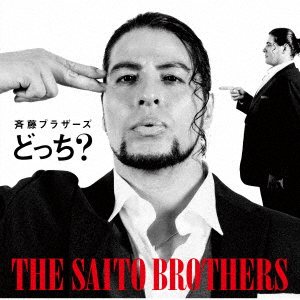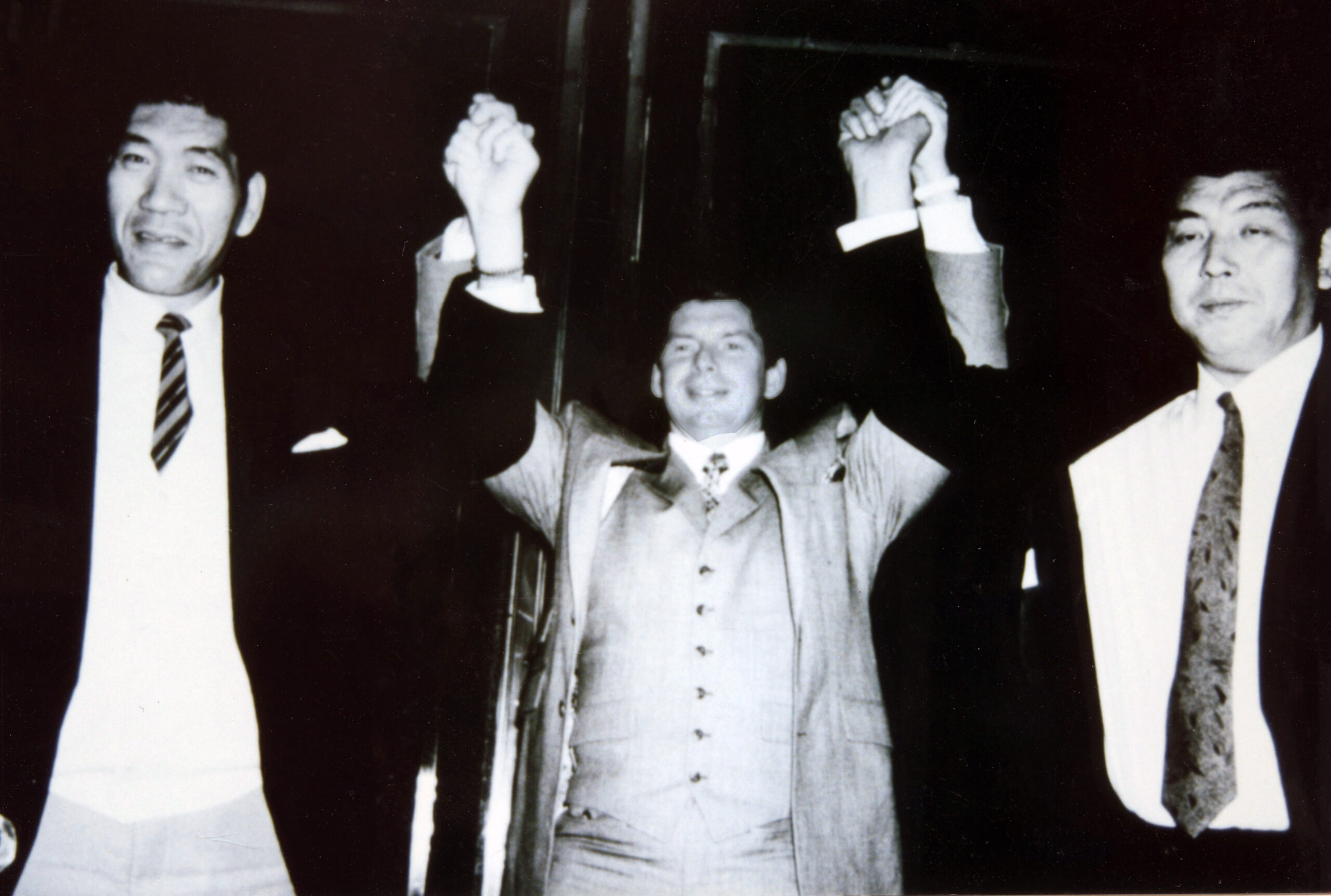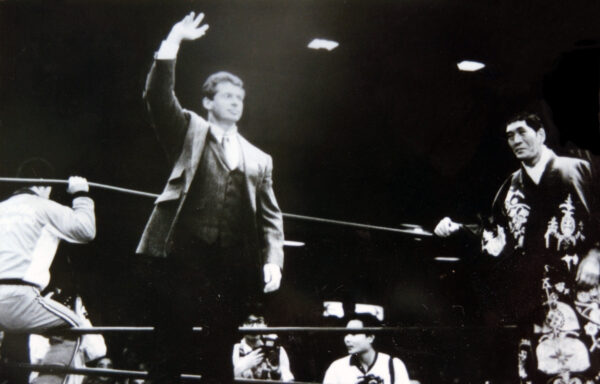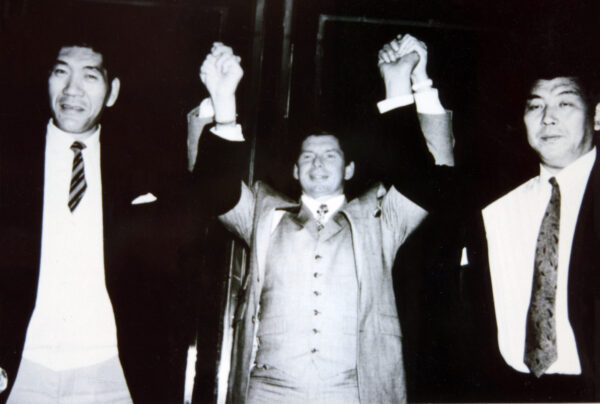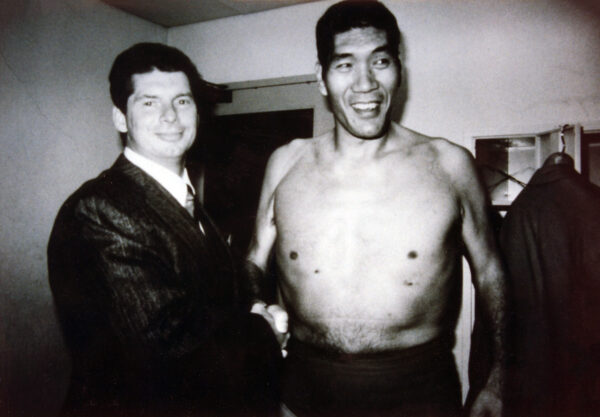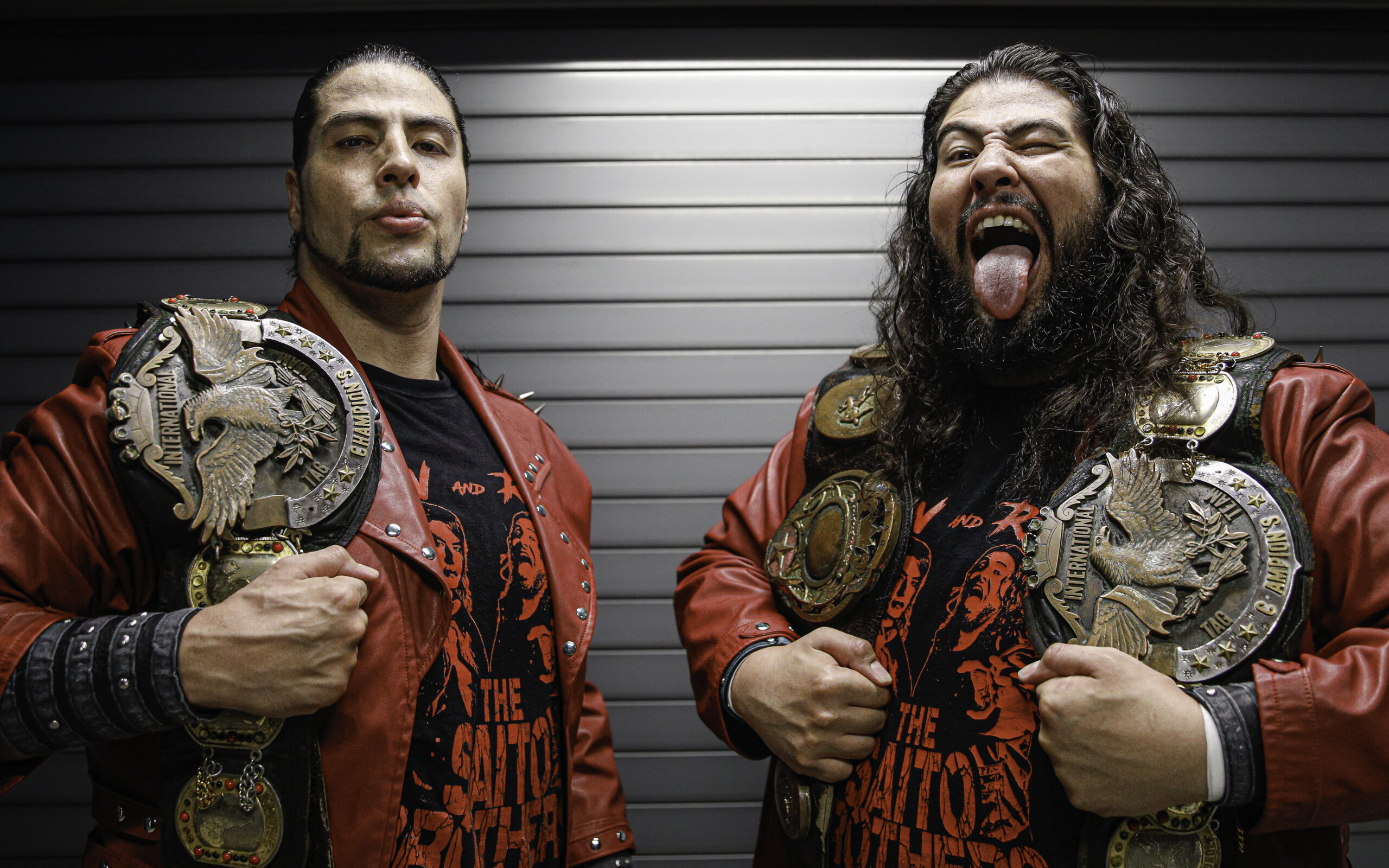
Jun & Rei Saito Discuss Their Budding Music Career, The All Japan Triple Crown Title, And Fighting One Another
When Dokken’s “Dream Warrior” begins to play in whichever venue All Japan Pro Wrestling is stationed for the day, fans are immediately locked in for the “DOOM!” that comes next. Jun & Rei Saito are twin brothers who are well accomplished in the world of sports, playing football in America before pursuing sumo careers in Japan … and, eventually, pro wrestling. Standing at 6-foot-3 and 6-foot-4, respectively, with a combined weight of 559 lbs, the Saito Brothers in some ways feel like a blast for the past—a nod to All Japan’s well-documented history of having big, physically imposing wrestlers at the forefront. With their red-and-black color scheme and an affinity for leather, the Saitos make up what they lack in wrestling experience with pure charisma and being effortlessly cool.
Jun & Rei have arisen as two of Japanese puroresu’s most popular rising stars. This year marks four years since their debut, and their accomplishments speak for themselves. They are two-time (and current) AJPW World tag team champions, as well as the 2024 victors of AJPW’s World’s Strongest Tag Determination League tournament. In 2023, they won Tokyo Sports’ Newcomer Award, and the Best Tag Team Award the following year. Somewhere in the midst of their shared success, the brothers have also managed to establish themselves as top singles wrestlers. Jun Saito currently holds All Japan’s top prize, the Triple Crown championship, after defeating Davey Boy Smith on New Year’s Eve.
Their next milestone to conquer? Music. Recently, Jun & Rei Saito announced that they would be releasing their first single on February 26, from the album entitled Which One? There is a long history of the music and wrestling industries intertwining to bring new fans to both worlds—and the Saito Brothers are eager to add themselves to that list.
PWI contributor Lyric Swinton caught up with Jun & Rei—with the help of translator Ash Mann—to chat about their upcoming music, their current goals, being faces of All Japan, and how they feel about fighting one another.
PWI: It was announced that you both would be entering the musical world with a debut single titled “DOOM,” anticipated for February 26 release date. Wrestlers doing music isn’t a new concept, with the Crush Gals being the biggest and most successful example. Did either of you have a musical background before this? What was your thought process when coming to the decision to make music?
Rei: We had absolutely no experience in music at all. Even we were surprised when we were going to make our very first single, but obviously the goal is to expand and broaden the horizons of people to get into wrestling.
PWI: You two have only been wrestling since 2021, but you’ve managed to accomplish a lot in a fairly short amount of time. What were your initial goals when you entered pro wrestling coming from the sumo world? Did you expect this level of success so early on?
Rei: In All Japan Pro Wrestling, the goal is to win the World tag titles, obviously. Because we’re a tag team, right? We want to be the best tag team [and win] the Best Tag Team Prize in the Tokyo Sports Awards, which we also managed to win [in 2024]. It’s been maybe, say, about three and a half years since we debuted. We managed to get all this experience. So, we felt that with experience, we’d get results and get the confidence to get all these results in a short amount of time. We spent about eight years in the sumo world, so we have the physical ability to do it. We’ve just [had] to put it into the wrestling sense, and you can see the results.
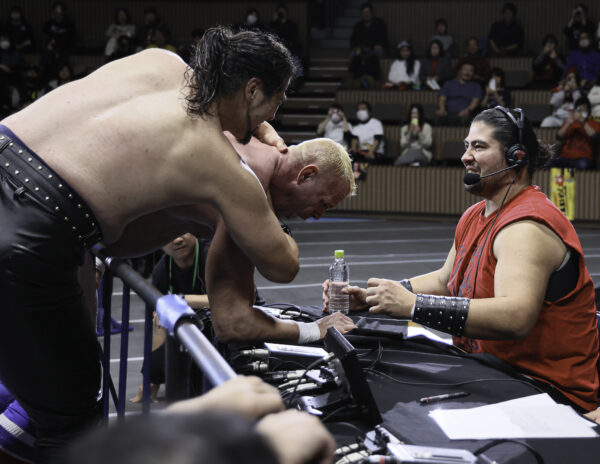
PWI: Over the past year, you’ve won the All Japan World tag team championship for a second time, expanded your stable to include Mr. Saito and Senor Saito, won World’s Strongest Tag Determination League, and took home the Best Tag Team Prize from the Tokyo Sports awards. And you placed number seven on the “PWI Tag Team 100.” How do you feel about the 2024 you had? And are there any milestones you’re looking to conquer in 2025?
Jun: In 2024, we won the Tokyo Sports Best Tag Team Prize. We’re very happy, but disappointed we didn’t get the MVP award. The top prize—the top, top prize—I think Zack Sabre (Jr.) won. We’re a little bit disappointed about that. For 2025, we hope to win the MVP Award as a tag team for the very first time … because it hasn’t been accomplished in Tokyo Sports awards at all.
Rei: In 2024, I had a right shoulder injury. So, I was out for a month, but I came back in tip-top form. And, as a tag team, we were actually unbeaten the whole year.
PWI: Jun, you are currently the Triple Crown champion, holding one of the most prestigious wrestling titles of all-time. We saw you rise to the occasion as a singles wrestler quite a bit in 2024, first making it to the Champion Carnival final and eventually winning the title on New Year’s Eve. Talk about what your journey to the Triple Crown has been like, and what you hope to convey to fans during your reign.
Jun: Obviously the Saito Brothers, everybody knows us as a tag team. We’ve been working as a tag team our whole entire careers. And then, when I was in the Champion Carnival, I didn’t manage to win it. But I managed to go all the way to the finals, and that’s a pretty amazing result. Of course, for a singles wrestler in All Japan, the top title is Triple Crown, right? And to be able to get it before my brother [Rei], it makes me very happy … There has not been a title match between brothers for the Triple Crown yet, so I would love to accomplish it. But if Rei decides to challenge me, I will say no until he actually stacks up his own accomplishments and enough wins to get there.
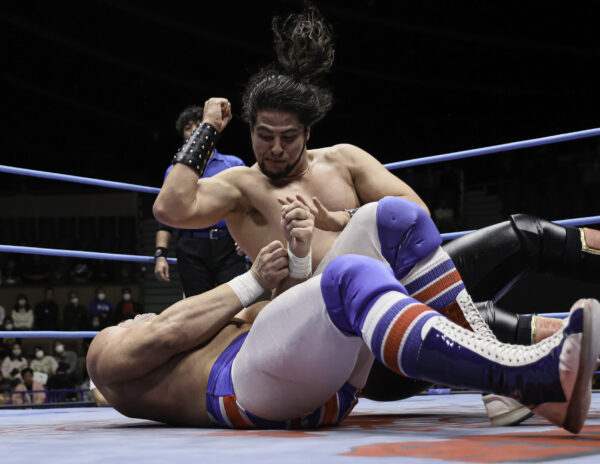
PWI: How do you feel about that, Rei?
Rei: I have seen my brother’s effort to become champion. I wish I could become champion, too, but I haven’t really [gotten results] as a singles competitor yet. I would love to work more on that singles front first, take part in tournaments, get some results, and maybe think about challenging for the Triple Crown if my brother [Jun] is still champion.
PWI: As fun as it is to watch you two as a team, it’s just as entertaining to watch you face each other. I had the pleasure of watching you two lock horns on New Year’s Eve in 2023 in Tokyo. And you never hold back. Why do you think your chemistry is so special not just as teammates, but also as opponents?
Rei: When it comes to wrestling and brothers fighting, I’m not gonna hold back. There’s no point holding back because as brothers, we’ve been fighting [since we were] kids, so this is normal for us.
Jun: It’s not difficult. In fact, it’s very easy. Because many years ago, when we were still doing sumo, in the early years, there were two brothers who were yokozunas, the top ranked sumos. When they had the finals together and they fought, they didn’t really like fighting each other … On the other hand, for me, if it’s a fight between brothers, I will not only just put in 100%, maybe like 120%. It’s actually very easy. It’s more natural that way. Maybe it might be a bit more tiring, by going that extra [mile] just to beat the other brother.
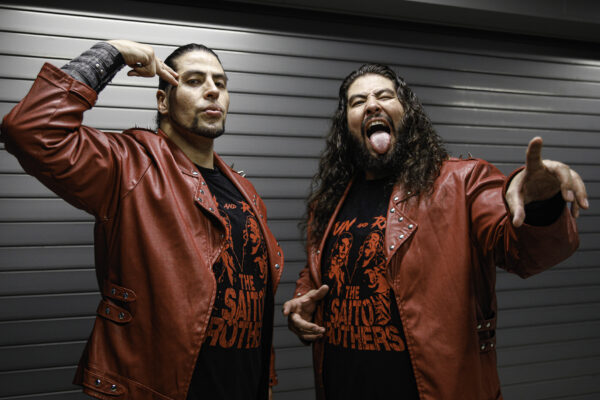
PWI: I’ve seen fans in Jun and Rei costumes at shows, and even outside of wrestling. Your popularity in Japan is growing larger and larger by the day. What does the support from fans mean to you both? Does it ever get overwhelming?
Jun: Wrestling fans, the fans give wrestling its energy. Years ago, when we were debuting, Coronavirus [was happening], [there were] no crowds, nothing at all. But when the crowds came back, we felt like we could work extra hard. Because the roar of the crowd and the cheers of the fans when they call our names, it gets us more excited and helps us put the extra gear in to make the matches more exciting. I’m really thankful that the fans cheering really helps to make the wrestling [more exciting]. I’m very thankful to get the support of the fans.
Rei: Even though it’s fighting and it’s sports, it’s also entertainment. So, I’m very thankful that we have support of fans right now.
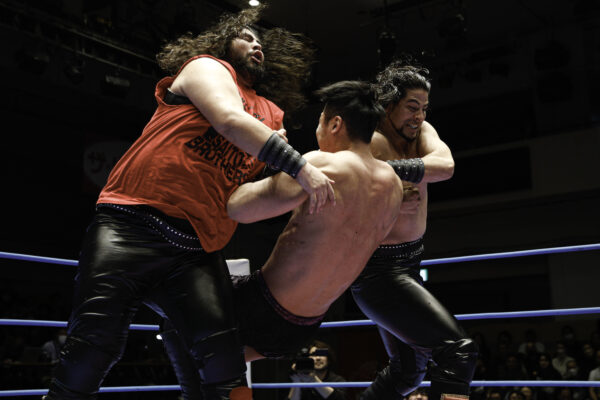
PWI: You both have American heritage and have spent some time on excursions there at the beginning of your careers. Now that you both are no longer rookies but legitimate forces to be reckoned with, are there any dream matches in America, or even other promotions in Japan that you’d like to have?
Jun: As a tag team, we always want to win the Tokyo Sports Best Tag Team award. In 2023, it was Bishamon, [NJPW’s] Hirooki Goto and YOSHI-HASHI. I still remember when they won the thing. We won the Best Tag Team prize this past year, so obviously I would love to challenge Bishamon one day.
Rei: As wrestlers, we haven’t been to the U.S. in a while. We would love to wrestle in the United States. We [would] like to wrestle in Europe as well. We definitely would love to give a try to AEW or WWE once in our careers, because I’m sure every wrestler would have thought about that at least once in their careers.
PWI: It feels like a new era for All Japan and stars like you, Yuma Anzai, Ren Ayabe, and others are at the forefront of that new era. All Japan Pro Wrestling has a rich and storied past, but it also has an energetic and exciting present. What does it mean to both of you to be faces of such an important organization in wrestling history?
Rei: Obviously, All Japan Pro Wrestling has a very long history. Many fans overseas, they know the history with Giant Baba. We all know the history. It’s very, very long and very, very storied. Now for us to be able to be in this very historic promotion, we’re very honored to be here, but I feel that we’re not at the peak yet. And, going forward, we’re gonna still try to reach that peak and [make] All Japan more and more exciting.
Jun: When you think of All Japan, you think of very big guys, very big, large individuals. And they bring a lot of exciting, hard fights [and] intense bouts. In the ’80s and ’90s, wrestling in Japan was at its peak. Everybody knows it’s the hottest thing. But lately, in a sense [that buzz] has gone to other sports, like MMA and whatever else. The pro wrestling spirit is still in Japan. It’s still there. And we would like to bring that spirit and the fan base back via our exciting bouts in All Japan Pro Wrestling.

